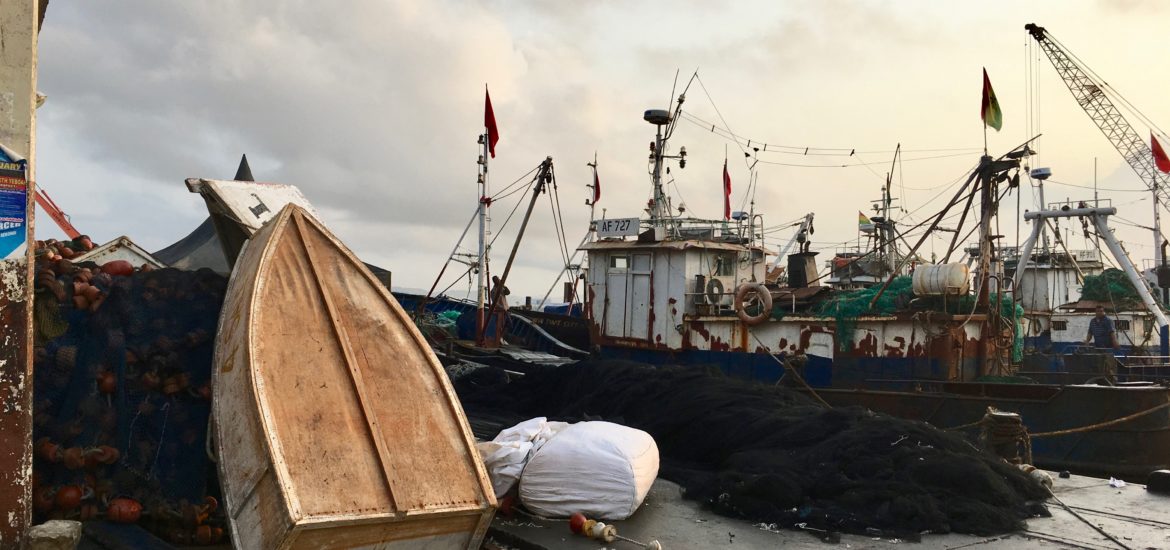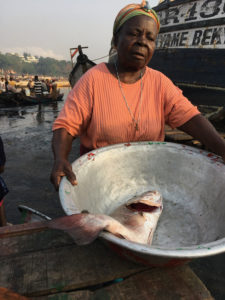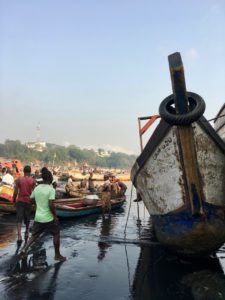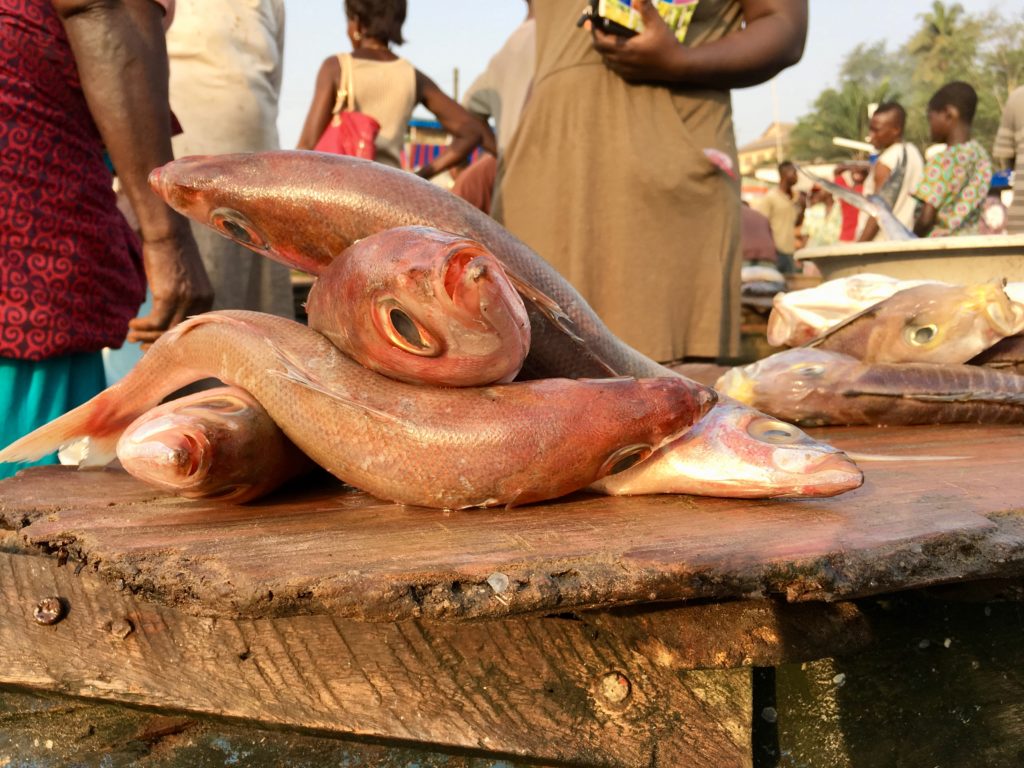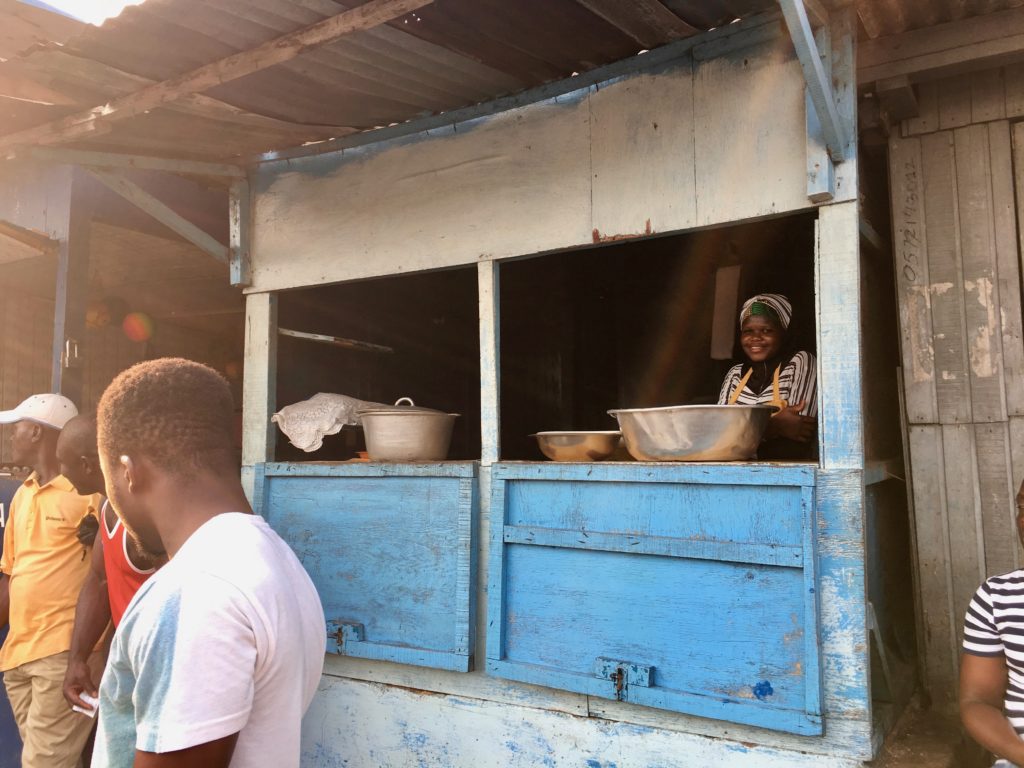Yesterday morning I dragged myself out of bed at 5.15, snagged a leftover piece of pizza, and trudged down the road to where a cab was waiting. I paid the cab driver 3/4 of my daily allowance (I know, I need to get better at figuring out a cheap way to get to Beach Road. If I do the journey in two legs it is possible, but I thought at 5.30am a direct cab was probably my best and safest bet.)
At the other end of my cab journey, I met my coworker’s house girl, Dorcas, and another newly arrived expat. Dorcas was making her monthly trip to the fish market in Sekondi to stock up, so the two of us were tagging along to learn our way around the market (and figure out what the non-obruni prices for things should be).
Sekondi-Takoradi are actually a ‘twin city’ – originally two separate entities along the coast, they’ve grown into each other and now constitute the fourth largest city in Ghana. Sekondi was once the larger and grander of the two. There’s a section of the city along the waterfront is known as the European Old Town, full of old colonial structures now crumbling towards the sea. Takoradi now tends to take first rank among the two cities with its busy market circle drawing in locals and the deep-sea port keeping it relevant to the oil trade. However, Sekondi still has the fish market.
After a brief but very welcome cup of coffee, Dorcas grabbed a cooler from the basement and bundled us into another cab which took us along the sea front. If anyone is in the area, I really recommend the drive in early morning; it was a gorgeous view of the sea and all the boats and platforms off shore, with the sun still glinting as it rose. I dropped a pin on my phone so I can go back and take more photos sometime soon.
There are two fish markets in Sekondi, more or less right next to us. When we arrived we were too late for the formal market, which sits under a concrete canopy and where the fish occasionally sit on a bed of ice to keep fresh. Instead we went to the informal market just to the West. The market is essentially a cluster of canoes pulled up in the muddy sand near the naval hospital, where informal stalls lay out their wares and old ladies kneel on blankets, scaling and gutting fish for smoking later.
Ghanaians tend to eat fish (or at least serve them) whole, and when you ask them to cut it for you, you’re more likely to end up with the whole thing chopped through instead of crafted into the gut-and-eyeball-free filets we’re habituated to in England or the US. Thankfully, my coworker’s wife spent some time with Dorcas at the market last summer, with the result being that Dorcas could then show us which vendors know how to prepare fish into something a bit less scary for our squeamish obruni sensibilities.
The fish market had pretty much any kind of fish you might expect to find in warm waters – tuna, sharks, kingfish, monkfish, one of those quite flat and freaky looking fishes, and of course all kinds of crabs and shrimp and langoustine/lobster type creatures.
Quite a lot of the fish were smaller than you would expect or eat at home – many of the fisherman have seen a large decrease in their catches over the past decade and they generally blame the oil companies. However the Chinese trawlers that sit off the coast are due an awful lot more of the blame, as are the increasingly desperate and unsustainable techniques the fishermen themselves use. Overfishing is a massive problem, and the fisheries commission has helped promote the use of light and other ‘technologies’ which make fishing a year-round instead of part-time endeavor. Unfortunately, while these techniques have resulted in short term increases in income for the fishermen, what they ultimately do is interrupt the mating and spawning seasons of the fish, and make the whole system much more unsustainable.
After a bit of deliberation, we followed Dorcas’ lead, and ended up with some ‘red’ (bluefin) tuna and kingfish each. Altogether I probably paid about £5 (25 cedis) for 10 smallish portions of fish. Sainsburys has been helpfully sending me ads for Tuna and Mango tacos, so I’m quite looking forward to the results.
Dorcas also kindly took us to the market in Takoradi after Sekondi, where I was able to grab the other bits I’d been wanting – including some flour, baking soda, and rosemary – I just need some yeast and a scale so I can start in on some baking in earnest now. I need to get myself to Accra soon to get some bits I’m missing (scale, Brita pitcher for the water, pyrex for the oven) and the things that are extortionate in Takoradi (butter, UHT milk). But in the meantime my coworker has leant me his yoghurt maker so I’ve got some experimenting to entertain myself with this week.
